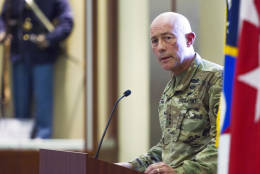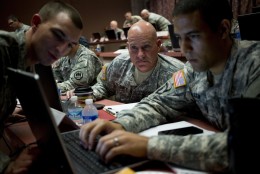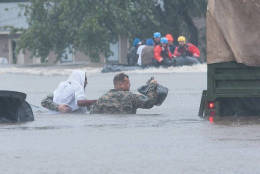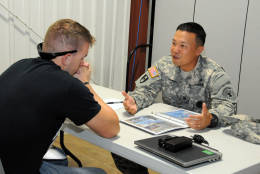Army
-
The Pentagon said Wednesday that it expects to permanently stop collection procedures for the vast majority of National Guard soldiers who, according to various audits, got bonuses they weren’t technically entitled to between 2004 and 2011.
December 08, 2016 -
The Army Reserve’s new leader says it’s time for a fresh look at the map so that his component of the Army can make the most of its ability to harness the skills its citizen-soldiers get from their civilian jobs.
November 17, 2016 -
The Army is going through a drawdown, which means lots of officers are finding themselves without jobs. Some of them are talented soldiers with advanced degrees — the very type of people Defense Secretary Ash Carter wants for the future military.
November 08, 2016 -
Rumors of the death of Army Knowledge Online — the web portal soldiers and Army civilians have used for everything from training to email since the 1990s — were evidently premature.
November 07, 2016 -
The Army is currently experimenting with a concept it calls cyber support to corps and below (CSCB) — the notion that individual tactical units need to deploy with their own offensive and defensive cyber and electronic warfare capabilities and be prepared for an enemy that can and will use electronic attacks on the battlefield.
November 07, 2016 -
Last month, the Army, along with the rest of the military services, announced all of the active duty cyber teams they’re building for U.S. Cyber Command have reached their initial operating capability and are ready for offensive and defensive missions. Next in line: teams made up entirely of National Guard and Army Reserve personnel.
November 04, 2016 -
Welcome to the #FedFeed, a daily collection of federal ephemera gathered from social media and presented for your enjoyment.
November 01, 2016 -
The Pentagon says its new Silicon Valley-based technology outreach office is seeing some early successes in rapid acquisition. It handled its first dozen procurements in an average time of 60 days. But most of the money it spent went to established companies, not garage-style startups.
October 25, 2016 -
The project, known as the Army Private Cloud Enterprise, represents the first time the Army has contracted with a private company to run a large-scale data center inside the gates of a military installation.
October 14, 2016 -
Nora Bensahel, distinguished scholar in residence at American University, and retired Lt. Gen. David Barno, a distinguished practitioner there, are co-authors of The Future of the Army, published by the Atlantic Council. They walked Federal Drive with Tom Temin through some of the budget challenges the Army currently faces.
October 11, 2016 -
National Guard units were activated in several East Coast states over the weekend to help with the relief effort in the aftermath of Hurricane Matthew.
October 10, 2016 -
Eric Fanning, the secretary of the Army, said last week that he's ordered a new initiative designed to reduce time-consuming requirements directed by Department of the Army headquarters, particularly with regard to training.
October 10, 2016 -
The Army closed out the fiscal year that ended a little over a week ago having met its recruiting goals for the first time in five years.
October 10, 2016 -
The Army is taking a fresh look at how much of the development and sustainment of computer code ought to be left to contractors and whether it’s time to bring some of that work in-house.
October 10, 2016 -
The JRSS effort will eventually consolidate about 125 separate points of Army cyber defense into 25 shared, regional centers to protect both classified and unclassified networks.
October 06, 2016














